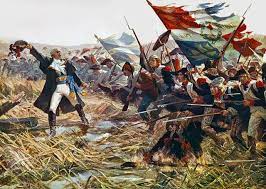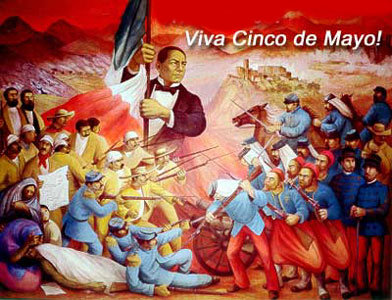Or, Reasons to celebrate May 5
Cinco de Mayo! For many, this Mexican holiday is simply an opportunity to guzzle coronas, eat tacos, and stumble around in a beerdrunk rampage wearing stereotypical fake ponchos, borderline racist moustaches and sombreros. The affectionate American name for the holiday is Cinco de Drinko, and that more or less sums up what most people know about it.
The holiday in fact exists to commemorate the battle of Puebla, an important event in the history of Mexico. Puebla was where, on 5 May 1862, a poorly equipped Mexican battalion of six hundred men under one Ignacio Zaragoza defeated a better equipped and technologically advanced French army of six thousand five hundred, sent by the French emperor Louis Napoleon the Third. The young and impoverished Mexican republic was at the time only forty years independent from Spain and reeling from a recent civil war. A progressive party, committed to establishing a republic in Mexico, had emerged victorious, but had no sooner assumed power that it had war declared upon it by the three most powerful empires of the age – Britain, Spain and France.
The official reason for this humanitarian intervention? To restore good government and end the anarchy in Mexico. The real reason probably had more to do with the fact that the new president had declared that that the poor country would not repay its debts to Spanish, British and French creditors for two years, so that it could focus on rebuilding after civil war. It was Louis Napoleon who eventually sent an army to capture Mexico city.

The world expected a quick victory for the French. Zaragosa ‘s desperate stand at Puebla would see that it would not be so. He met the French at Guadalupe and Loreto and manned a stunning defence of the city – only ninety of his men would die, compared to one thousand French soldiers that would lay dead at Puebla, among them members of feared elite French legionnaire corps.
Louis Napoleon, would throw every thing he had at Mexico. Eventually, France would prevail. But Puebla and Zaragosa remained a powerful national memory and rallying point for the Mexican resistance, and by 1867, Mexico was independent again.
5 May is also the birthday of one firebrand political journalist for the New York Tribune by the name of Karl Marx. Marx reported often and passionately on the situation in Mexico.

In a Tribune Article written in London, November 1861, Marx says, ‘The contemplated intervention in Mexico by England, France, and Spain, is, in my opinion, one of the most monstrous enterprises ever chronicled in the annals of international history’. Rubbishing the great powers stated objective that the intervention was meant to end the ‘anarchy’ in Mexico, Marx bluntly states, “There exist in England no people desirous of an intervention in Mexico save the Mexican bondholders’. He says
“The Blue Book on the intervention in Mexico, just published, contains the most damning exposure of modern English diplomacy with its hypocritical cant, ferocity against the weak, crawling before the strong, and utter disregard of international law…The despatches exchanged between Downing Street and the British representatives of Mexico [are] the irrefragable proof that the present imbroglio is of English origin, that England took the initiative in bringing about the intervention, and did so on pretexts too flimsy and self-contradictory to even veil the real but unavowed motives of her proceedings. The infamy of the means employed in starting the intervention is only surpassed by the anile imbecility with which the British government affect to be surprised at and slink out of the execution of the nefarious scheme planned by themselves.”
Zarogosa’s great defeat of Louis Napoleon on his birthday would no doubt have brought Marx some birthday cheer. Marx regarded Louis Napoleon a ridiculous and vapid figure, whose only credit lay in being able to claim to be a descendant of the Napoleon. It was Louis Napoleon’s overthrow of the seconnd French Republic, echoing his ancestors more famous overthrow of the original republic, that had moved Marx to pen one of his most famous sayings, ‘History repeats itself, the first time as tragedy, the second time as farce’.
Louis Napoleon had spent his youth as a socialite in London before becoming elected president on a campaign of essentially the nineteenth century equivalent of ‘make France great again’. After his win, he promptly suspended the constitution and declared himself emperor. He was keen to cover himself in martial glory worthy of his ancestor, but Ignacio Zaragosa trouncing the French army on 5 May would cover him only in ridicule. But as much as he loathed Louis Napoleon, for Marx Mexico was indicative of the logic of 19th century imperialism. Behind the great civilizing rhetoric of Western Europe lay the interests of bankers and capital.
In his much overlooked career as a political journalist, Marx reported widely on the momentous events of his day – India and the 1857 Sepoy uprising against British rule, the Opium Wars in China, the Crimean War, Turkey, the Anglo Persian War of 1857, the French and Spanish colonialisation of North Africa and of course on Mexico – all of which shaped his views greatly on bourgeoisie capitalist civilisation. For Marx, it would not have been an accident that the age of colonialism began with the birth of capitalism.

In his genuine concern for the rights of non-Europeans, Marx differentiated himself greatly from his contemporary socialists and anarchists like Proudhon, Blanqui and Louis Blanc, who were either indifferent to the rights of non-Europeans or even actively supportive of colonialism as a way of saving the white European working class. Indeed, Marx would move on quite significantly from his own youthful views in the Manifesto, where he had suggested the capitalist mode of development to be relatively beneficial for the lesser developed nations compared to ancient modes of feudalism. There would be none of this in his essays on British Rule in India ten years later :
“A [colonial] government never had more than three departments: finance (plunder at home), war (plunder at home and abroad), and public works (provision for reproduction). The British government in India has administered Nos. 1 and 2 in a rather philistine spirit and dropped No. 3 entirely, so that Indian agriculture is being ruined…The ruling classes of Great Britain have had, till now, transitory interest in the progress of India. The aristocracy wanted to conquer it, the moneyocracy to plunder it, and the millocracy to undersell it.”
For Marx, it was increasingly clear that colonialism was the true reasons why capitalism was successful in the West, and defeating the one went hand in hand with the defeat of the other. When one reads the passage quoted above by Marx on English intervention in Mexico, one is struck by the eerie familiarity of it all.
So, on the next 5 May, let us raise a glass to Marx on his birthday if for nothing else his passionate opposition to colonialism, and to Zaragosa for his immortal victory over the those same forces of liberal humanitarian colonialism, for though the names of the conflicts may be different, their times are still our times.
